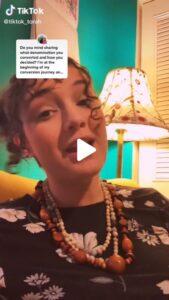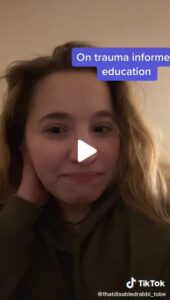
On TikTok, anyone can watch and discover millions of personalized short video clips of any genre and about any topic. While there are positives and negatives to social media utilization, TikTok has opened up a whole new world to educators and viewers alike.
HUC-JIR students and alumni use TikTok as a tool, a way to enhance their education and work. Rabbi Rachael Pass ’21 puts it simply: “TikTok works when you find your niche – mental health, education, Judaism, LGBTQ+, feminism – and can create a lot of engagement. It is great for short clips, brief moments of inspiration, or laughs, but not for longer videos or complex content.”
“I use TikTok to show folks that Torah and text study can be accessible, light-hearted, and open.”
 Master of Educational Leadership (MEdL) alum Liana Wertman ’22 runs an online Torah Learning center called The Torah Studio and using social media to connect with learners is very important in this project. She shares, “Our goal as an institution is to make Torah and Jewish texts as accessible as possible. But many folks are intimidated by Torah learning before they’ve begun. They might feel that they’re not learned enough to start studying, or they might think only rabbis have important or fun things to say about these texts. I use TikTok to show folks that Torah and text study can be accessible, light-hearted, and open.
Master of Educational Leadership (MEdL) alum Liana Wertman ’22 runs an online Torah Learning center called The Torah Studio and using social media to connect with learners is very important in this project. She shares, “Our goal as an institution is to make Torah and Jewish texts as accessible as possible. But many folks are intimidated by Torah learning before they’ve begun. They might feel that they’re not learned enough to start studying, or they might think only rabbis have important or fun things to say about these texts. I use TikTok to show folks that Torah and text study can be accessible, light-hearted, and open.
“I try to share teachings, interpretations, and information about Torah in a way that feels fun and simple so folks can begin seeing themselves in the texts. My favorite video I’ve made is one about how queer Jews have read the Naomi and Ruth relationship as romantic, even though this is not reflected at all in our interpretive tradition. It’s short and silly, but it highlights the experience of knowing we are seeing ourselves in the text but being told we’re not actually there. As a queer Jewish educator, I love sharing queer interpretations of Torah texts in my TikToks, often inspired at the moment by current TikTok trends.”
Liana continues, “For years, I’ve been seeing an increase in young, queer Jews seeking to reconnect deeply with Judaism, and its wealth of traditions and knowledge. They’re less connected to institutions and very interested in self-directed education. TikTok catches folks in their niches with its algorithm, and unlike Instagram and Facebook, it shows them content outside of their immediate or even wider circles. When we put our content on TikTok, we can access folks who have been using social media to learn more about Judaism in ways we’ve never been able to before, and on their terms.”
 A former classmate of Liana, Eliana Rubin, MEdL ’22, shares about the content she focuses on: “One way I connected TikTok with my academic work was through Jewsicals (Jewish musicals) that I write. Jewsicals began at the URJ 6 Points Creative Arts Academy (CAA), and are short musical numbers based on our sacred texts. I’m creating a curriculum guide to teach LGBTQ+ terms and topics to high schoolers through Jewsicals, and I occasionally post drafts of my Jewsicals on TikTok. It’s been wonderful to interact with other people, some of whom are musical, some of whom are LGBTQ+, some of whom are Jewish, some of whom are a mix of these three categories, and others still who fall into none of them. Another way I connected TikTok with my academic work was with a short series I did called ‘Sesame Shul,’ where I did an Elmo impression and set it at Elmo’s b’mitzvah service. More and more muppet characters popped up (such as Big Bird, Grover, and Miss Piggy). At one point, I created a TikTok that had Elmo practicing the Shema, and much later, someone commented that this TikTok was how they learned the Shema prayer.”
A former classmate of Liana, Eliana Rubin, MEdL ’22, shares about the content she focuses on: “One way I connected TikTok with my academic work was through Jewsicals (Jewish musicals) that I write. Jewsicals began at the URJ 6 Points Creative Arts Academy (CAA), and are short musical numbers based on our sacred texts. I’m creating a curriculum guide to teach LGBTQ+ terms and topics to high schoolers through Jewsicals, and I occasionally post drafts of my Jewsicals on TikTok. It’s been wonderful to interact with other people, some of whom are musical, some of whom are LGBTQ+, some of whom are Jewish, some of whom are a mix of these three categories, and others still who fall into none of them. Another way I connected TikTok with my academic work was with a short series I did called ‘Sesame Shul,’ where I did an Elmo impression and set it at Elmo’s b’mitzvah service. More and more muppet characters popped up (such as Big Bird, Grover, and Miss Piggy). At one point, I created a TikTok that had Elmo practicing the Shema, and much later, someone commented that this TikTok was how they learned the Shema prayer.”
Similar to Eliana, rising third-year rabbinical student Rachael Houser has found community among her creative work through TikTok. Rachael, who does not use any social media aside from TikTok, explained: “I started TikTok two months into the pandemic because I wanted to watch, and then I started to make funny videos. It became an enormous and beautiful part of my life. It has allowed me to connect to the young Jewish community in a beautiful way.”
“Even people who aren’t Jewish have reached out to ask questions, and if that can help eliminate antisemitic rhetoric or passively eliminate it, that’s a good thing.”
 Rachael’s brand is TikTok Torah, and she shares topics ranging from concepts learned in her HUC classes to her Jewish journey. “When I was converting to Judaism, it was an experience that wasn’t talked about much. No one talks about the imposter syndrome or how much it costs to convert. Now, hundreds of people have reached out to me to share their experiences and people don’t feel like they are alone. When you illuminate the more private parts of your life in a way that ends up helping other people, they can see we have a lot in common. Even people who aren’t Jewish have reached out to ask questions, and if that can help eliminate antisemitic rhetoric or passively eliminate it, that’s a good thing.”
Rachael’s brand is TikTok Torah, and she shares topics ranging from concepts learned in her HUC classes to her Jewish journey. “When I was converting to Judaism, it was an experience that wasn’t talked about much. No one talks about the imposter syndrome or how much it costs to convert. Now, hundreds of people have reached out to me to share their experiences and people don’t feel like they are alone. When you illuminate the more private parts of your life in a way that ends up helping other people, they can see we have a lot in common. Even people who aren’t Jewish have reached out to ask questions, and if that can help eliminate antisemitic rhetoric or passively eliminate it, that’s a good thing.”
Dalilah Bernier was accepted to HUC and is planning to start rabbinical school in 2023. Currently the Springboard Ezra Fellow at Hillel Milwaukee, she works with students to create TikToks and finds these videos are a great way to engage students. She explained that before TikTok, there were accounts and websites like Hey Alma and Modern Ritual (created by Rabbi Samantha Frank ’19 and Rabbi Rena Singer ’20). “Those are so successful because they provide people an opportunity to have Judaism meet them where they are.” This is exactly what HUC community TikTokers do.
“I’ve had secular and non-observant Jews reach out to me thanking me for educational content that allows them to explore, understand, and embrace their own connections to Judaism.”

Rising second-year rabbinical student Eden Anolick also believes sharing Jewish educational content on TikTok is important. They said, “One of my favorite videos was derived directly from a conversation with classmates while reading and analyzing Parashat Vayeitzei prior to our Parashat HaShavuah class. I’ve had secular and non-observant Jews reach out to me thanking me for educational content that allows them to explore, understand, and embrace their own connections to Judaism. I’ve interacted with Jews of Choice, or people considering Judaism, and helped them gain more knowledge about a religion they feel drawn to. I’ve had wonderful comments from non-Jews excited to engage in interfaith learning. There are Jewish teenagers who have reached out to exclaim that they prefer learning about Judaism on TikTok than at Hebrew school. All in all, I believe that sharing Jewish educational content allows people from all walks of life to interact with Judaism and Jewish thought and ideas in new, exciting ways, and gain a better understanding of the religion.”
Emily Dana, a rising fifth-year rabbinical student, shared, “One of the biggest things TikTok has brought me is an interfaith community that I could not have gotten any other way. I am within a network of a ton of progressive clergy from a variety of denominations. As a result of our interactions on TikTok, we created a Facebook group about a year and a half ago and have Zoom calls every couple of months. When there is antisemitism, we talk about it with our colleagues of other faiths. Creating these connections allows us to have friendships, write things together, combat hatred together, and be there for one another.”
Emily noted that TikTok can be very taxing and she brings disability awareness, grief, and trauma education into her videos. Rachael limits her usage to one to two hours a day and said she goes through every single question and comment to delete hateful comments, as she chooses not to engage. She explains, “I don’t have time for it and I don’t think people are making them in good faith. I answer questions or reach out privately if it needs more than 100 characters to address the comments. I’m lucky that I don’t get a lot of hate. I’m focused on the bible or just me, and not trying to make broad statements about what Jewish life is like because I’m just one small part.”
“I could see Jewish educational creators working together to raise each other’s voices and engage in discourse with each other as well.”
 Social media platforms constantly change their algorithms, interfaces, rules, and more. When asked what they see for the future of informal education through platforms like TikTok, Eden answered, “With more and more youth engaging in social media, I can see TikTok being used to bolster interest and engagement of teens and young adults within our religion. Through posting comments and following others, I feel like many people find a sense of connection to their favorite creators. Sharing Jewish content allows for that same connection to be found. I could see Jewish educational creators working together to raise each other’s voices and engage in discourse with each other as well.”
Social media platforms constantly change their algorithms, interfaces, rules, and more. When asked what they see for the future of informal education through platforms like TikTok, Eden answered, “With more and more youth engaging in social media, I can see TikTok being used to bolster interest and engagement of teens and young adults within our religion. Through posting comments and following others, I feel like many people find a sense of connection to their favorite creators. Sharing Jewish content allows for that same connection to be found. I could see Jewish educational creators working together to raise each other’s voices and engage in discourse with each other as well.”
Rabbi Pass predicts that “the future of TikTok education will depend on how long the platform can stay relevant – there’s a huge benefit to keeping Jewish living and education relevant to other aspects of life, and TikTok is certainly an aspect of young adult and teen life right now.”
Staying relevant and using TikTok strategically has been a theme among interviewees.
Rabbi Jeremy Barras ‘02, Senior Rabbi at Temple Beth Am in Pinecrest, FL, explained that his synagogue and day school are starting to focus more efforts and resources on social media. He said, “So many young families are always on their phones. Instead of having an announcement made, we post some funny skits to announce that something is happening. When you get their attention, you have a very short amount of time. We want to grab their attention with something funny and at the end, present a call to action.”
Rabbi Barras notes that social media should complement what you are doing for outreach in terms of bringing people in. It can’t replace individualized outreach like a personal phone call or conversation.
Liana elaborates on the topic of strategy. “I think TikTok is a great space for small-scale informal education, but thoughtfully and as a part of a bigger whole. Jewish educators can use TikTok to share facts, stories, and information about Jewish life that is often overlooked, and that might spark inspiration and interest in learners continuing to seek more information. That means we shouldn’t just be thinking about TikTok, but how to connect activated watchers to learning opportunities and organizations.”
